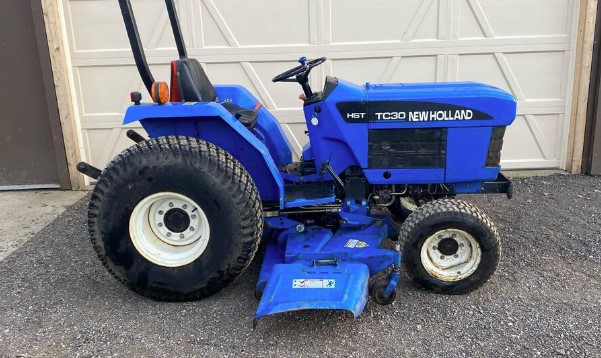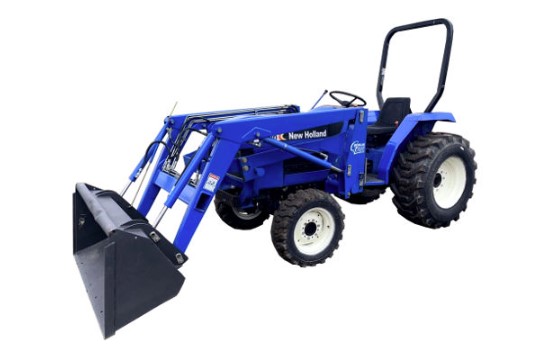The New Holland TC30 is a powerful and versatile piece of machinery designed to provide reliable performance in a variety of settings. However, it can sometimes experience problems that can decrease its effectiveness or even make it unusable. In order to maintain the longevity and reliability of the tractor, it is important to be aware of common New Holland TC30 problems that may arise with this machine and how they can be resolved. This article will provide an overview of some potential problems associated with the New Holland TC30 as well as solutions to help ensure optimal functionality.
Are you curious to know what are the common problems of New Holland TC30? Look no further!
| Problem | Solution |
|---|---|
| Electrical issues | Check battery, fuses, and wiring; replace faulty components |
| Hydraulic system problems | Inspect fluid level and quality; repair or replace faulty parts |
| Transmission problems | Check fluid level and quality; inspect and repair or replace faulty parts |
| Engine overheating | Check coolant level and quality; clean the radiator |
| Steering problems | Inspect and repair or replace faulty parts |
| PTO not engaging or disengaging | Inspect and repair or replace faulty parts |
Common New Holland TC30 Problems and Solutions

New Holland TC30 users may experience a range of issues, ranging from simple to more complex. Common New Holland TC30 problems include electrical issues, hydraulic system problems, transmission problems, engine overheating, steering difficulties and PTO not engaging or disengaging. Fortunately for those affected by such occurrences, many times these are able to be resolved with straightforward solutions. Professional assistance is available should the problem remain unresolved after trying out implementation of simple remedies.
Electrical Issues
If you are having difficulty with your electrical system, it is important to check the battery, fuses and wiring for any damage or loose connections. Replacing any faulty components is necessary to ensure that the system functions properly. It may also be beneficial to have a qualified technician inspect the system in order to identify any deeper issues that should be addressed.
Hydraulic System Problems
It is important to inspect a hydraulic system regularly for any signs of leaks, slow operation or unusual sounds. If these signs are noticed, it is recommended that the fluid level and quality be checked immediately in order to ascertain the cause. Any faulty parts should then be repaired or replaced promptly in order to ensure optimal performance of the hydraulic system.
Transmission Problems
If any grinding, slipping or difficulty is noticed while shifting gears, it is essential to check the fluid level and quality. It is also recommended that any faulty parts should be inspected and repaired or replaced as soon as possible in order to ensure optimal performance of the vehicle.
Engine Overheating
If the engine is overheating, it is important to check both the coolant level and quality. Once verified, cleaning the radiator may help remove any dirt, debris, or bugs that are blocking proper airflow and causing an overheat. This can be done by brushing off potential obstructions with a stiff brush or using a vacuum cleaner. It is also essential to ensure that all components of the cooling system are working properly for optimal performance.
Steering Problems
It is important to be vigilant when it comes to the health of your vehicle. If you notice any unusual noises or difficulty in steering, it is recommended that you inspect and repair or replace any faulty parts. This ensures that all components are functioning properly, keeping you safe as well as protecting your investment.
PTO Not Engaging or Disengaging
If the PTO is not working as expected, it is important to inspect and repair or replace any faulty parts. It is advisable for professionals to check for problems with the PTO if it does not seem to be engaging or disengaging properly. To ensure optimal performance of the power take-off system, inspecting and replacing any faulty components should be done on a regular basis.
Keep Your New Holland TC30 Running Smoothly: Important Implications to Consider
- Regular maintenance and inspections are essential in helping to prevent any issues from occurring.
- Taking prompt action can help avoid minor problems becoming larger issues down the line.
- If unsure of how to address a problem, it is recommended to seek professional advice for the best resolution possible.
Keeping Your New Holland TC30 in Top Condition
New Holland TC30 owners may encounter problems from time to time, but most can be resolved with a few simple steps. Regular maintenance and inspections are key in ensuring the tractor is kept in good working condition. If any issues arise, it's important to address them promptly.
In the event that an issue cannot be solved without professional assistance, consulting a qualified technician should always be considered as an option. With proper upkeep and care, New Holland TC30 users will benefit from its high performance for many years to come.
